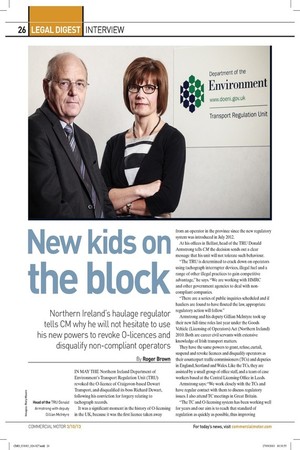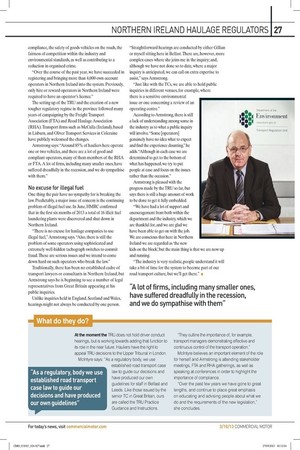New kids on the 'hind(
Page 20

Page 21

If you've noticed an error in this article please click here to report it so we can fix it.
Northern Ireland's haulage regulator tells CM why he will not hesitate to use his new powers to revoke 0-licences and disqualify non-compliant operators By Roger Brown Head of the TRU Donald Armstrong with deputy Gillian McIntyre
IN MAY THE Northern Ireland Department of Environment's Transport Regulation Unit (TRU) revoked the 0-licence of Craigavon-based Dewart Transport, and disqualified its boss Richard Dewart, following his conviction for forgery relating to tachograph records. It was a significant moment in the history of 0-licensing in the UK, because it was the first licence taken away
from an operator in the province since the new regulatory system was introduced in July 2012.
At his offices in Belfast, head of the TRU Donald Armstrong tells CM the decision sends out a clear message that his unit will not tolerate such behaviour.
"The TRU is determined to crack down on operators using tachograph interrupter devices, illegal fuel and a range of other illegal practices to gain competitive advantage," he says. "We are working with HMRC and other government agencies to deal with noncompliant companies.
"There are a series of public inquiries scheduled and if hauliers are found to have flouted the law, appropriate regulatory action will follow."
Armstrong and his deputy Gillian McIntyre took up their new full-time roles last year under the Goods Vehicle (Licensing of Operators) Act (Northern Ireland) 2010. Both are career civil servants with extensive knowledge of Irish transport matters.
They have the same powers to grant, refuse, curtail, suspend and revoke licences and disqualify operators as their counterpart traffic commissioners (TCs) and deputies in England, Scotland and Wales. Like the TCs, they are assisted by a small group of office staff, and a team of case workers based at the Central Licensing Office in Leeds.
Armstrong says: "We work closely with the TCs and have regular contact with them to discuss regulatory issues. I also attend TC meetings in Great Britain. "The TC and 0-licensing system has been working well for years and our aim is to reach that standard of regulation as quickly as possible, thus improving
compliance, the safety of goods vehicles on the roads, the fairness of competition within the industry and environmental standards, as well as contributing to a reduction in organised crime.
"Over the course of the past year, we have succeeded in registering and bringing more than 4,000 own-account operators in Northern Ireland into the system. Previously, only hire or reward operators in Northern Ireland were required to have an operator's licence."
The setting up of the TRU and the creation of a new tougher regulatory regime in the province followed many years of campaigning by the Freight Transport Association (FTA) and Road Haulage Association (RHA). Transport firms such as McCulla (Ireland), based in Lisburn, and Oliver Transport Services in Coleraine have publicly welcomed the changes.
Armstrong says: "Around 85% of hauliers here operate one or two vehicles, and there are a lot of good and compliant operators, many of them members of the RHA or FTA. A lot of firms, including many smaller ones, have suffered dreadfully in the recession, and we do sympathise with them." No excuse for illegal fuel
One thing the pair have no sympathy for is breaking the law. Predictably, a major issue of concern is the continuing problem of illegal fuel use. In June, HMRC confirmed that in the first six months of 2013 a total of 16 illicit fuel laundering plants were discovered and shut down in Northern Ireland.
"There is no excuse for haulage companies to use illegal fuel," Armstrong says. "Also, there is still the problem of some operators using sophisticated and extremely well-hidden tachograph switches to commit fraud. These are serious issues and we intend to come down hard on such operators who break the law."
Traditionally, there has been no established cadre of transport lawyers or consultants in Northern Ireland, but Armstrong says he is beginning to see a number of legal representatives from Great Britain appearing at his public inquiries.
Unlike inquiries held in England, Scotland and Wales, hearings might not always be conducted by one person.
"Straightforward hearings are conducted by either Gillian or myself sitting here in Belfast. There are, however, more complex cases where she joins me in the inquiry; and, although we have not done so to date, where a major inquiry is anticipated, we can call on extra expertise to assist," says Armstrong. "Just like with the TCs, we are able to hold public inquiries in different venues, for example, where
there is a sensitive environmental issue or one concerning a review of an operating centre."
According to Armstrong, there is still a lack of understanding among some in the industry as to what a public inquiry will involve. "Some [operators] genuinely have no idea what to expect and find the experience daunting," he adds. "Although in each case we are determined to get to the bottom of what has happened, we try to put people at ease and focus on the issues rather than the occasion."
Armstrong is pleased with the progress made by the TRU so far, but says there is still a huge amount of work to be done to get it fully embedded. "We have had a lot of support and encouragement from both within the department and the industry, which we are thankful for, and we are glad we have been able to get on with the job. We are conscious that here in Northern Ireland we are regarded as 'the new
kids on the block; but the main thing is that we are now up and running. "The industry is very realistic, people understand it will take a bit of time for the system to become part of our road transport culture, but we'll get there." • 'A lot of firms, including many smaller ones, have suffered dreadfully in the recession, and we do sympathise with them"











































